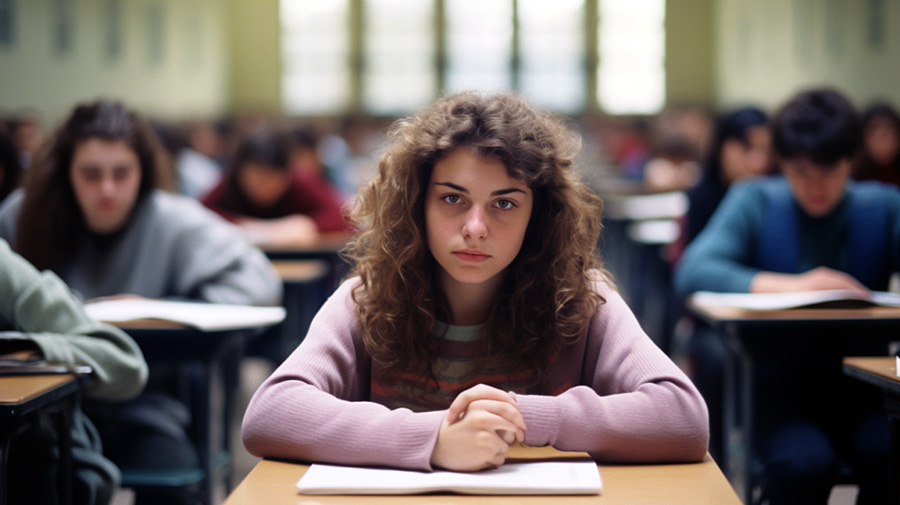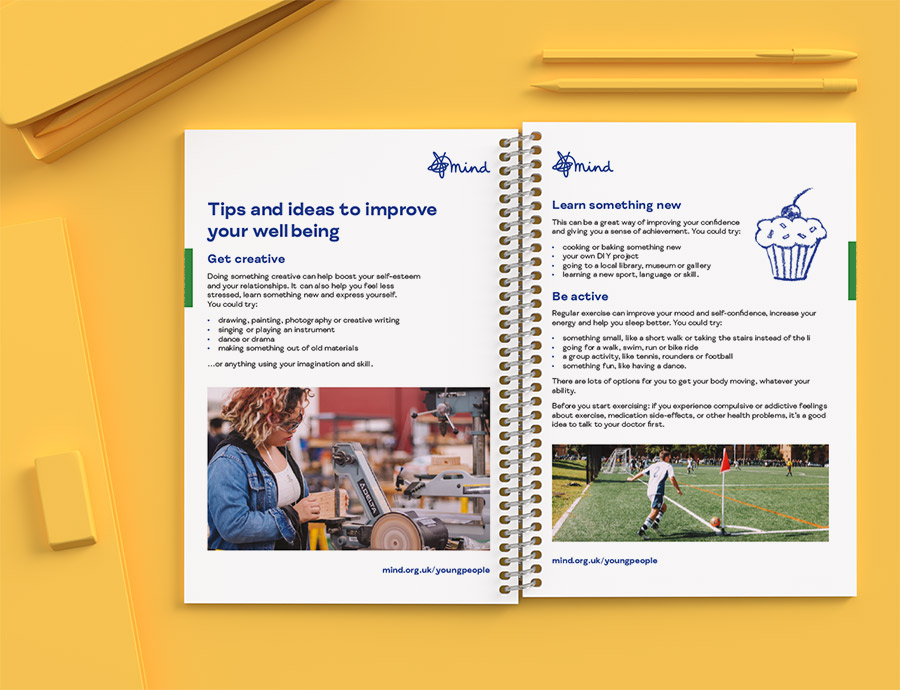The NHS, recognizing the potential of custom school planners as a mindfulness tool, is rapidly expanding its services to provide schools with such mindfulness tools for children in response to massive demand. Record numbers of children are accessing mental health services, and it’s not difficult to work out the reason for this.
Covid-19 and the subsequent lockdowns have damaged and disrupted children’s lives, from missing schools, interrupting routines, and delaying essential support services. Not only that, but the issues that children face ordinarily – expectations at school, social issues such as friendships and bullying, and social media, were compounded as they met with new uncertainties when the pandemic hit.
A recent analysis by the BBC has shown a staggering 77% increase in the number of children needing specialist treatment for severe mental health crisis between April and October 2021. So, what can be done in schools to help children through these difficult times?
Tackling these problems early seems to be key, and schools are the ideal place to introduce children to ways of coping with difficult emotions. While mindfulness is not a new concept in schools, the incorporation of custom school planners as a mindfulness tool is gaining traction in its approach to tackle the mental health crisis in children. Let’s take a closer look at the issues that have been arising over the past couple of years, what the NHS and government plan to do to help, and how this affects schools.

How the pandemic has affected children’s mental health
First of all, it is important to point out that data on the impact of the pandemic is limited, mixed, and difficult to interpret. However, as we consider the potential role of custom school planners as a mindfulness tool, it’s worth noting the varied experiences children had during these times. Not all children had such a challenging time during the lockdowns; some children reported in studies that they actually experienced an increase in well-being and enjoyed spending time at home with loved ones. What this shows us, as we already know as teachers, parents, and members of society, is that some children benefit from being in the home environment and some do not.
For many vulnerable children, Covid has intensified known risk factors and disrupted the health services that supported them. Schools, where custom school planners are becoming an increasingly important mindfulness tool, are often the place where children at risk can be nurtured. Any issues can be flagged with the appropriate authorities and support put in place. The lack of this constant in children’s lives has clearly had an impact, as the data above shows. Even for children that were not at risk, there has been a significant effect – as all children missed a large amount of time being in a ‘normal’ school setting, with the usual routines and expectations that the school environment, supplemented by tools like custom school planners, brings.
Governmental policies that support the mental health crisis in schools
In 2019, before the pandemic hit, plans were laid out to improve mental health services for children in the government’s 2019 Long-Term Plan. These plans have now been accelerated and £79m has been pledged to allow this to happen. In May 2021, the NHS announced:
“Around 400 mental health support teams will be up and running covering 3,000 schools in England, offering support to almost three million pupils, by 2023.”
NHS England
The thinking behind the pledge is that by combatting mental health problems early on in a person’s life, more serious mental health issues can be avoided later down the line. Sir Simon Stevens, the chief executive of the NHS, pointed out that they are going ‘further and faster’ to help prevent mental health problems intensifying in years to come. Claire Murdoch, the Mental Health Director for NHS England, urged caregivers to access any help available:
“As children have returned to the classroom, dedicated NHS mental health support teams will be in place at 3,000 schools across the country ready to listen to any anxieties they may have and I would urge everyone whether you’re a teacher, parent or child to access this help before any issues escalate.”
Claire Murdoch, the Mental Health Director for NHS England
However, experts say that this is still not enough, and that wider issues need to be addressed such as social and educational activities and tackling socio-economic disadvantages and expanding family support much further.
How schools themselves can support pupils with anxiety
Even for children who did not suffer during the lockdowns and have done well academically, fitting back into school routines and expectations can be challenging. Being part of a social circle and making friends can be more of an obstacle after missing out on months of learning valuable social skills. This conflict causes stress and anxiety about going to school. Integrating custom school planners as a mindfulness tool can aid in easing this transition. So, what can schools do today to help pupils deal with this anxiety? Well, beyond the conventional methods, tools like custom school planners exist and are accessible to all.
Meditation and mindfulness
Children in a primary school in Stafford have been introduced to meditation and mindfulness classes. The head reported that “after lockdown, children found it tricky to get back into everyday routines.” The classes gave children the tools they needed to improve their mental well-being and cope with anxiety. Tools really are vital for children to acquire, as they can use them at any time or in any place. If a child is taught how to calm their breathing, mind and thoughts, then this can stop problems from escalating.
Expectations
Personally, as a supply teacher who regularly works in different schools, I have noticed that some children are struggling to follow the usual routines and are having problems with friendships which causes tears and upset during learning time. Many primary-aged children may not have had a full ‘normal’ year since being in nursery or reception. Having realistic expectations is key and building play or stress release time into the day may help enormously. It is also beneficial to talk about friendships, sharing and how to deal with disagreements.
Tools in the classroom
Many schools that I have visited have responded brilliantly to the additional needs that children are facing in these times and have provided ‘calm’ areas for children to retreat to practise mindfulness when needed. Although discipline always has a place in schools, it is not the only appropriate response to an unruly class. Giving children tools such as breathing exercises to do, books to read, colours to calm the mind, all help to combat anxiety and create a happier and more orderly classroom, and ultimately happier children who are more ready and able to learn.
Online resources
There are numerous resources out there to help your school introduce mindfulness into the everyday environment. A quick google will bring endless websites with free resources, lesson ideas and videos. Twinkl has over 6,000 resources on its website.
Cosmic Kids yoga is already popular in schools, but did you know that they also have mediation videos as well which are simple and aimed at children of all ages? Find them here.

Custom School Planners: A Powerful Mindfulness Tool for Students
In today’s fast-paced world, mindfulness – the practice of being present and fully engaged in the moment – has become a sought-after quality. Often associated with yoga, meditation, or deep breathing exercises, it’s surprising for some to learn that a simple custom school planner can serve as a powerful mindfulness tool. Here’s why:
- Personalization Equals Investment: When students design their planners, choosing colors, themes, or even personal photos, they feel an innate connection to the material. This personal investment encourages frequent use and can serve as a daily reminder to stay grounded and organized.
- Tangible Reality: In a digital age, having something tangible to write in can help to anchor thoughts, tasks, and reflections. The act of physically writing has been shown to improve memory and comprehension. It also fosters a sense of accomplishment as tasks are crossed off.
- Daily Reflection: Custom planners can include spaces not just for academic tasks but also for personal reflections. Whether it’s jotting down what they’re grateful for each day, tracking moods, or noting down a positive experience, this practice encourages students to be in touch with their emotions and promotes introspection.
- Visualization of Time: Seeing a whole week or month spread out can help students understand time in a more tactile way. They can visually compartmentalize their days, setting aside time for study, relaxation, and self-care. This balance is key for mindfulness as it underscores the value of being present in various facets of life, not just academics.
- Distraction-Free Planning: Unlike digital tools, which can bombard users with notifications, a custom planner offers a focused environment. Planning in such a distraction-free space allows students to center themselves, prioritize tasks, and delineate their goals clearly.
- Holistic Approach to Life: Custom planners can be designed to include sections for not just academics but other areas of life – fitness goals, personal reading lists, hobbies, etc. By integrating all these into one planner, students are subtly reminded of the holistic nature of their lives, promoting balance and mindfulness.
In essence, custom school planners are more than just an organisational tool. It’s a daily companion that fosters a deeper connection with one’s goals, tasks, and personal reflections. By grounding students in the present and helping them visualise their future, it becomes an invaluable tool for cultivating mindfulness.
Conclusion
The cascading effects of the Covid-19 pandemic on the mental health of children cannot be ignored. As schools and the government grapple with the myriad of challenges that have arisen, it’s evident that there’s a pressing need for effective strategies to support the well-being of our students. The NHS’s drive to provide more mental health support to schools is commendable, but it also brings to light the importance of holistic approaches that address every aspect of a student’s life.
As we delve into potential solutions, the efficacy of mindfulness as a means to address these issues stands out. And while meditation, yoga, and breathing exercises have their place, the unlikely hero in this narrative may just be the custom school planner. Not only is it an organizational tool, but it also serves as an essential mindfulness tool. By creating a tangible space where students can reflect, plan, and engage with their emotions, it proves that sometimes, the simplest tools can have the most profound effects on our well-being. As educators, parents, and caregivers, integrating such tools into the daily lives of children might be the next crucial step in promoting resilience and emotional health.
Transform Classroom Well-being: Get Started with Custom School Planners
Dive into a world where organisation meets mindfulness, empowering students to navigate their academic journey with clarity and calm.